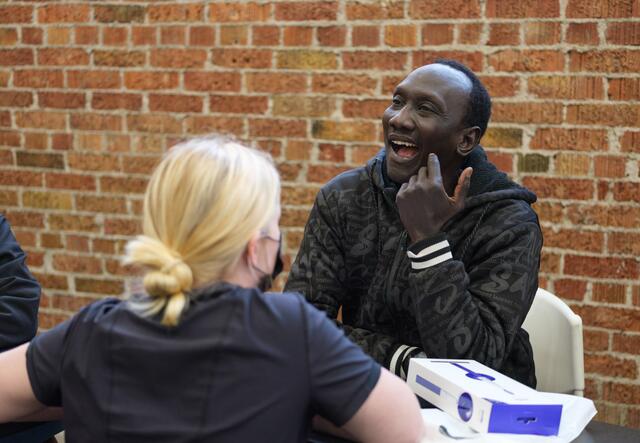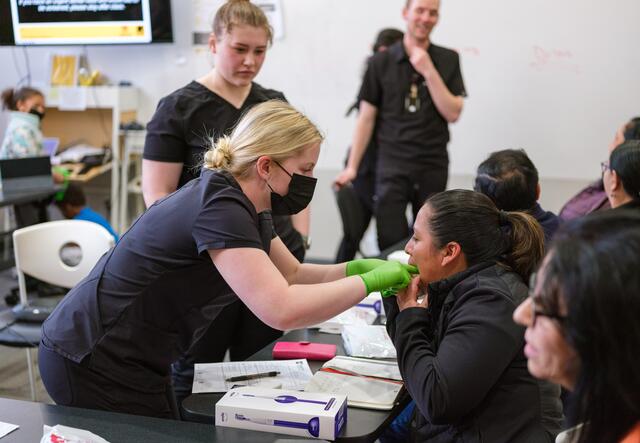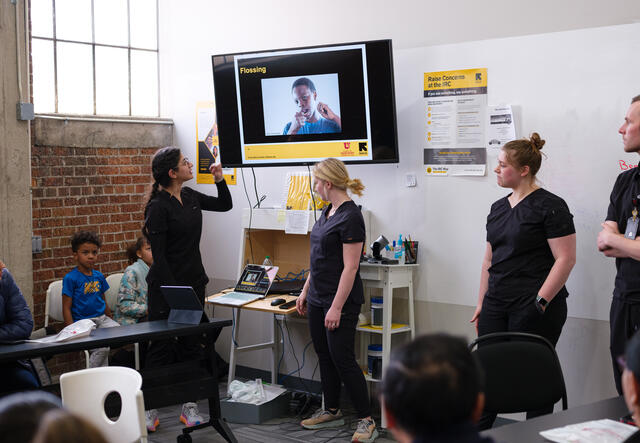The International Rescue Committee (IRC) in Salt Lake City’s health team works hard to aid the people that we serve with holistic health services. Through our health program, the IRC reaches every individual resettled, ensuring families are physically and mentally healthy through consistent and independent access to the local healthcare system. Prior to arrival in the U.S., refugees are at particularly high-risk for dental infection due to prolonged stays in refugee camps, malnutrition, lack of water, and torture-related injuries.
In Utah, while Medicaid currently covers children, pregnant women, and people with disabilities, this initial benefit available to refugee families does not cover general adult dental care. This results in gaps of care for individuals who may have lacked access to any care previously. Additionally, individuals may be unfamiliar with dental hygiene best practices, including brushing teeth often, flossing, using mouthwash and more. “Some of the people we serve have intense dental pain that affects every aspect of their lives,” said Hannah Parrish, health program manager, “It affects ESL or going to a job interview and all parts of starting their new lives that people don’t realize.”

Since 2019, the IRC in Salt Lake City has partnered with the University of Utah School of Dentistry to provide free dental health education classes and screenings. The partnership came about through a high need for dental care for refugees arriving to Utah. Yukiko Stephan, a third-year student at the University of Utah School of Dentistry, has been a leading force in this initiative. Yukiko worked for the IRC as a health promotion coordinator before becoming a student at the School of Dentistry in 2020. Her time at the IRC showed her the deep gaps in oral health access faced by refugee families.
“The number one health complaint we received during my time at the IRC was people having severe dental pain and no access to dental care. It was so hard to have to turn down providing care for people because of what insurance would cover or otherwise,” said Yukiko. Between October 2021 through June 2022, IRC SLC received approximately 607 dental referrals for adults and children of those only 207 children and 50 adults were able to receive the care they needed due to limited access to free service providers and a lack of insurance. All of these individuals needed extensive dental work: fillings, crowns, root canals, bridges, and other oral surgery.

Yukiko began working with the University of Utah as a partner and then as a student. By the time she started seeing patients in the U Health dental clinics, the University of Utah had expanded their partnership from seeing twenty-five clients of the IRC a month to fifty at their South Main Clinic. They were able to provide dental exams, accurate diagnoses, restorations and fillings, root canals, emergency treatment, extractions and partial dentures.
“Dental care and hygiene are an important area for anyone! For refugees arriving in the U.S. many of them spent years in a refugee camp with no access to dental care,” noted Yukiko.
This year, the IRC received a project grant from the Foundation for Dental Health Education focused on facilitating information sessions for families in need of dental care. The University of Utah School of dentistry students led these hour long classes with the help of an interpreter. Yukiko took her experience working with refugees and her knowledge of dentistry to create a curriculum for clients of the IRC. With the goal of preventative care, the curriculum provides education on steps individuals can take at home to manage their daily dental hygiene to what to expect at dental appointments.

“Our goal is to give access to the underserved communities. This partnership has been great for future dentists to develop empathy for this community and work with populations who dealt with trauma or other difficulties,” said Yukiko. The University of Utah School of dentistry is hoping to expand its clinics in the next years and see more patience under refugee status.
The IRC’s work with partner organizations ensures that we can provide essential services such as dental care to the people that we serve. As part of the Oral Health Coalition, the IRC in Salt Lake City works to raise the experience of refugee families in our community to advocate for changes to healthcare access. Dental Health Providers in or near Salt Lake County can learn more about providing accessible services to refugee families by emailing SaltLakeCity@Rescue.org. Otherwise, learn how your group can get involved in our work by visiting our Partner Hub »